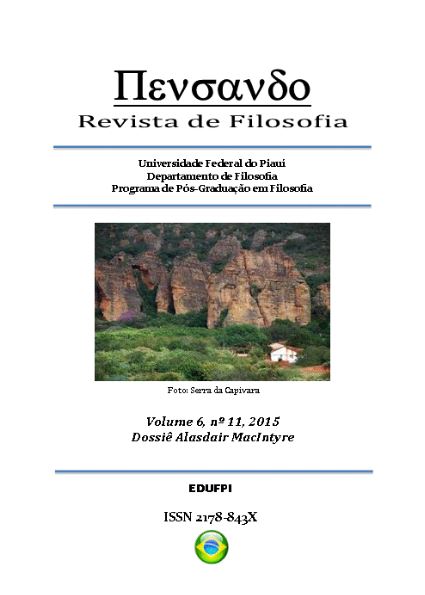LA ÉTICA COMO MEDIO PARA LA VIDA BUENA: UNA REFLEXIÓN DESDE A. MACINTYRE
DOI:
https://doi.org/10.26694/pensando.v6i11.3164Palabras clave:
MacIntyre, ética, virtud, regla/ley, felicidadResumen
En la actualidad, la ética está excesivamente centrada en la reflexión y en el establecimiento de reglas, de normas. Muchos debates sobre ética empiezan o acaban en la reflexión sobre qué normas o reglas deben aceptarse pública o universalmente, sobre cuáles de ellas deben ser leyes civiles, sobre qué comportamientos la ley civil debería prohibir y por qué. A juicio del autor, este hecho supone un reduccionismo y hace olvidar que lo más importante de la ética es el desarrollo integral del individuo. Las reglas tienen su importancia en ética, pero no son el factor más relevante en ella porque no son suficientes para ayudar al individuo al desarrollo de sus capacidades, para su vida buena. El artículo muestra cómo la virtud juega un papel fundamental en ese proceso.
Citas
ARISTÓTELES (1998), Metafísica, trad. García Yebra, Gredos, Madrid, 3ª reimpr.
— (1998) Ética nicomáquea, trad. Pallí Bonet, Gredos, Madrid, 4ª reimpr.
INNERARITY, D. (1992), Libertad como pasión, Eunsa, Pamplona.
MACINTYRE, A. (1971), Against the Self-Images of the Age: Essays on Ideology and Philosophy, Duckworth (y Trinity Press), London; y: Schocken Books, N. York, x+284 pp.
— (1981), After Virtue: A Study in Moral Theory, Duckworth, London; y: University of Notre Dame Press, Notre Dame (Indiana), ix+252 pp.
— (1988), Whose Justice? Which Rationality?, Duckworth, London; y: University of Notre Dame Press, Notre Dame (Indiana), xi+410 pp.
— (1990a), Three Rival Versions of Moral Enquiry: Encyclopaedia, Genealogy, and Tradition, Notre Dame University Press, Notre Dame (Indiana); y: Duckwort, London, x+241 pp.
— (1990b), First Principles, Final Ends and Contemporary Philosophical Issues, Marquette University Press, Milwaukee.
— (1990c), “The Privatization of Good. An Inaugural Lecture”, The Review of Politics, v. 52, n. 3 (Summer), pp. 344-361.
— (1991), “Nietzsche O Aristotele?”, en Conversazioni Americane, Giovanna Borradori, (ed.), Editori Laterza, Roma-Bari, pp. 169-187. Trad. inglesa: “Nietzsche or Aristotle?”, en (1994) The American Philosopher: Conversations with Quine, Davidson, Putnam, Nozick, Danto, Rorty, Cavell, MacIntyre, and Kuhn, G. Borradori, University of Chicago Press, Chicago, pp. 137-152. Reimpreso con el título “An Interview with Giovanna Borradori” en: (1998) The MacIntyre Reader, Kelvin Knight (ed.), Polity Press, Cambridge, pp. 255-66. Usamos esta reimpresión para este trabajo aunque indicamos en el texto el año de la publicación original.
— (1992), “Plain Persons and Moral Philosophy: Rules, Virtues and Goods”, American Catholic Philosophical Quarterly, v. 66, n. 1 (Winter), pp. 3-20. Reimpresión (con algunos cambios de detalle): (1998) The MacIntyre Reader, Kelvin Knight (ed.), pp. 136-52. En este trabajo, se citan las páginas de la reimpresión.
— (1994) “How Can We Learn What Veritatis Splendor Has To Teach?”, The Thomist, v. 58, pp. 171-195.
— (1996) “Wahre Selbsterkenntnis durch Verstehen unserer selbst aus der Perspektive anderer” (interview with Dmitri Nikulin), Deutsche Zeitschrift für Philosophie, v. 44, n. 4, pp. 671-683.
— (1998) “Aquinas’s Critique of Education: Against His Own Age, Against Ours”, en Philosophers on Education: New Historical Perspectives, A. Oksenberg Rorty (ed.) Routledge, London-N. York, pp. 95-108.
— (1999) Dependent Rational Animals: Why Human Beings Need the Virtues, Duckworth, London; y: Open Court Publishing, Chicago and La Salle (Illinois).
— (2000) “Theories of Natural Law in the Culture of Advanced Modernity”, en Common Truths: New Perspectives on Natural Law, Edward B. McLean (ed.), ISI Books, Wilmington, Delaware, pp. 91-115.
— (2006a), Edith Stein: A Philosophical Prologue. Continuum, London.
— (2006b), Ethics and Politics. Selected essays, vol. 2, CUP, N. York.
— (2009) “Intractable Moral Disagreements” y “From Answer to Questions: A Response to the Responses”, en CUNNINGHAM, L. (ed.), Intractable Disputes about the Natural Law. Alasdair MacIntyre and Critics, University of Notre Dame Press, Indiana, pp. 1-52 (cap. 1) y pp. 313-351 (cap. 10).
RUSSELL, Jack (2003), On MacIntyre, Thomson Learning (Wadsworth), Belmont.
TOMÁS DE AQUINO (2001), Suma de teología, BAC, Madrid, 4ª reimpr.

























